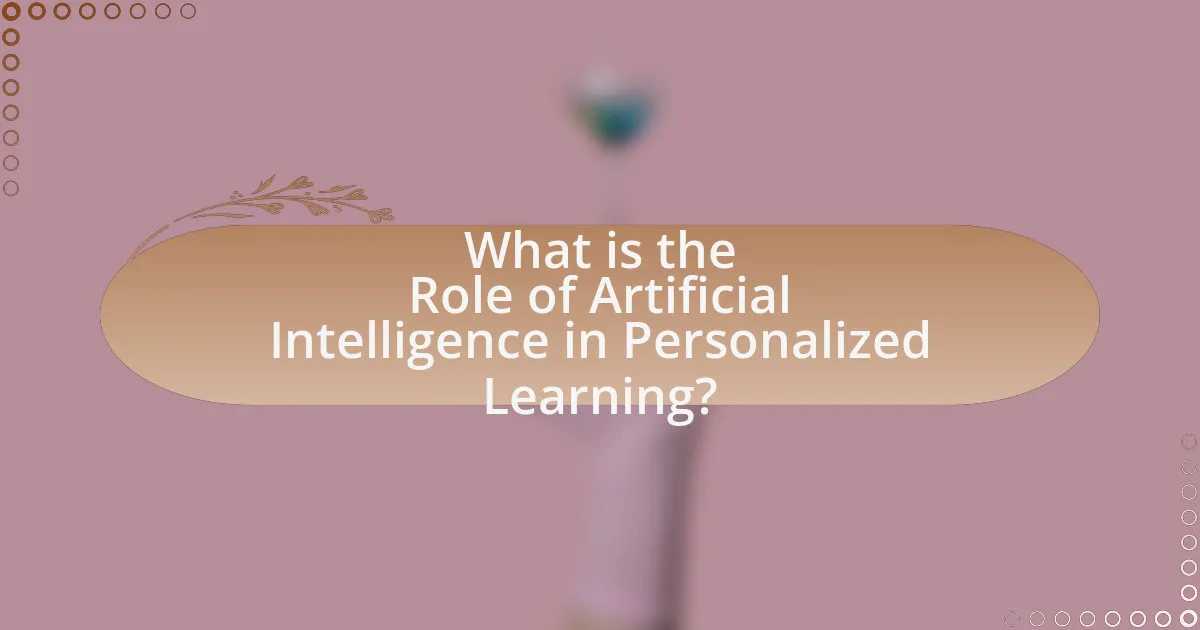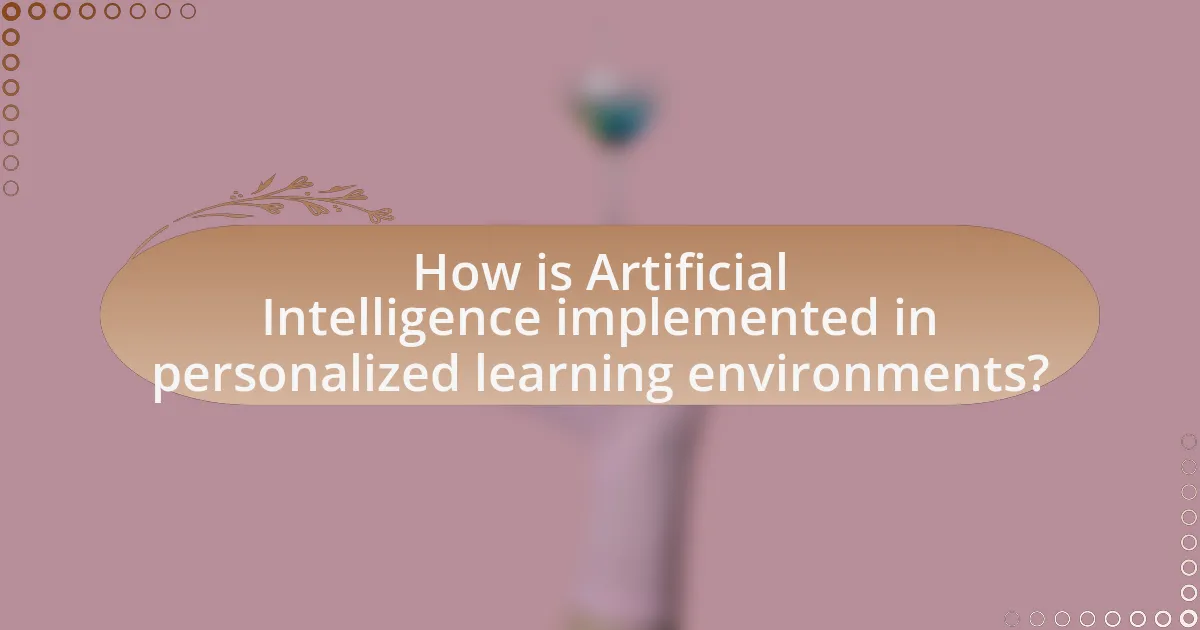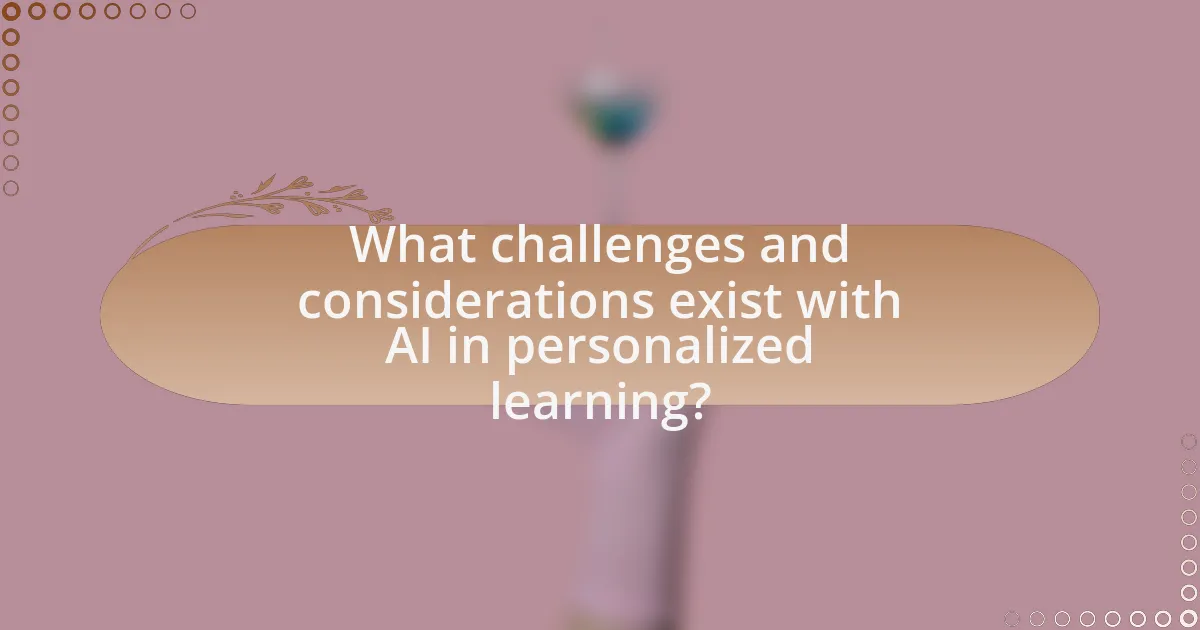Artificial Intelligence (AI) plays a pivotal role in personalized learning by creating adaptive educational experiences tailored to individual student needs. The article explores how AI analyzes student data to customize content and instructional strategies, enhancing engagement and improving academic outcomes. Key technologies involved include machine learning algorithms, natural language processing, and adaptive learning platforms, which collectively enable real-time adjustments to learning paths based on student performance. Additionally, the article addresses the benefits of AI in fostering student motivation, the ethical considerations surrounding data privacy and algorithmic bias, and the future trends that will shape personalized education.

What is the Role of Artificial Intelligence in Personalized Learning?
Artificial Intelligence plays a crucial role in personalized learning by enabling adaptive learning experiences tailored to individual student needs. AI systems analyze data from student interactions, such as learning pace, preferences, and performance, to customize educational content and strategies. For instance, platforms like DreamBox Learning and Knewton utilize AI algorithms to adjust the difficulty of math problems based on real-time student responses, enhancing engagement and effectiveness. Research indicates that personalized learning approaches can lead to improved academic outcomes, with studies showing that students using AI-driven platforms often outperform their peers in traditional settings.
How does Artificial Intelligence enhance personalized learning experiences?
Artificial Intelligence enhances personalized learning experiences by analyzing individual student data to tailor educational content and strategies. AI systems can assess a learner’s strengths, weaknesses, preferences, and pace, allowing for customized learning paths that adapt in real-time. For instance, platforms like DreamBox Learning utilize AI algorithms to modify math lessons based on student interactions, resulting in improved engagement and performance. Research indicates that personalized learning approaches can lead to a 30% increase in student achievement, demonstrating the effectiveness of AI in creating adaptive learning environments.
What technologies are involved in AI-driven personalized learning?
AI-driven personalized learning involves several key technologies, including machine learning algorithms, natural language processing, data analytics, and adaptive learning platforms. Machine learning algorithms analyze student data to identify learning patterns and preferences, enabling tailored educational experiences. Natural language processing facilitates interactive learning through chatbots and virtual tutors that can understand and respond to student inquiries. Data analytics provides insights into student performance and engagement, allowing educators to make informed decisions. Adaptive learning platforms utilize these technologies to adjust content and assessments in real-time, ensuring that each learner receives a customized educational journey.
How do these technologies adapt to individual learning styles?
Artificial intelligence technologies adapt to individual learning styles by utilizing data analytics and machine learning algorithms to assess and respond to each learner’s unique preferences and behaviors. These technologies analyze user interactions, such as response times and content engagement, to tailor educational experiences that align with visual, auditory, or kinesthetic learning styles. For instance, platforms like DreamBox Learning and Smart Sparrow employ adaptive learning techniques that modify content delivery based on real-time performance metrics, ensuring that learners receive personalized pathways that enhance their understanding and retention of material. This adaptability is supported by research indicating that personalized learning approaches can significantly improve student outcomes, as evidenced by a study published in the Journal of Educational Psychology, which found that students using adaptive learning technologies showed a 30% increase in performance compared to traditional methods.
What are the key benefits of using AI in personalized learning?
The key benefits of using AI in personalized learning include enhanced adaptability, improved engagement, and data-driven insights. AI systems can analyze individual learning styles and preferences, allowing for tailored educational experiences that meet each learner’s unique needs. For instance, a study by the Bill & Melinda Gates Foundation found that personalized learning approaches, often powered by AI, can lead to significant improvements in student outcomes, with some students showing up to a 30% increase in academic performance. Additionally, AI can provide real-time feedback and assessments, enabling educators to adjust their teaching strategies effectively and support students in a more targeted manner.
How does AI improve student engagement and motivation?
AI improves student engagement and motivation by providing personalized learning experiences tailored to individual needs and preferences. Through adaptive learning technologies, AI analyzes student performance data to identify strengths and weaknesses, allowing for customized content delivery that keeps students challenged yet capable. For instance, a study by the Bill & Melinda Gates Foundation found that personalized learning approaches can lead to significant improvements in student engagement and academic performance, with students showing increased motivation when they receive feedback and resources aligned with their learning styles. This targeted approach not only enhances understanding but also fosters a sense of ownership over the learning process, further motivating students to participate actively in their education.
What impact does AI have on learning outcomes and performance?
AI significantly enhances learning outcomes and performance by providing personalized educational experiences tailored to individual student needs. Research indicates that AI-driven platforms can analyze student data to identify strengths and weaknesses, allowing for customized learning paths that improve engagement and retention. For instance, a study published in the Journal of Educational Psychology found that students using AI-based tutoring systems scored 30% higher on assessments compared to those receiving traditional instruction. This demonstrates that AI not only personalizes learning but also leads to measurable improvements in academic performance.

How is Artificial Intelligence implemented in personalized learning environments?
Artificial Intelligence is implemented in personalized learning environments through adaptive learning technologies that tailor educational experiences to individual student needs. These systems analyze data from student interactions, such as learning pace, preferences, and performance, to customize content delivery and instructional strategies. For instance, platforms like DreamBox Learning and Knewton utilize algorithms to adjust the difficulty of exercises in real-time based on student responses, ensuring that learners receive appropriate challenges and support. Research indicates that personalized learning approaches can lead to improved student engagement and achievement, as evidenced by a study published in the Journal of Educational Psychology, which found that students using adaptive learning tools showed a 20% increase in math proficiency compared to traditional methods.
What are the different AI tools used in personalized learning?
Different AI tools used in personalized learning include adaptive learning platforms, intelligent tutoring systems, and learning analytics tools. Adaptive learning platforms, such as DreamBox and Smart Sparrow, adjust content and assessments based on individual student performance, providing a tailored learning experience. Intelligent tutoring systems, like Carnegie Learning and Knewton, offer personalized feedback and guidance, simulating one-on-one tutoring. Learning analytics tools, such as Tableau and Google Analytics, analyze student data to identify learning patterns and inform instructional strategies. These tools enhance engagement and improve learning outcomes by catering to the unique needs of each learner.
How do adaptive learning platforms utilize AI?
Adaptive learning platforms utilize AI by analyzing individual learner data to tailor educational experiences. These platforms employ algorithms that assess a student’s strengths, weaknesses, and learning pace, allowing for personalized content delivery. For instance, AI can recommend specific resources or adjust the difficulty of tasks based on real-time performance metrics, enhancing engagement and effectiveness. Research indicates that personalized learning approaches can lead to improved academic outcomes, as evidenced by a study from the Bill & Melinda Gates Foundation, which found that adaptive learning technologies significantly increased student retention and success rates in various educational settings.
What role do chatbots play in personalized education?
Chatbots play a significant role in personalized education by providing tailored learning experiences and immediate support to students. They can assess individual learning styles, preferences, and progress, allowing for customized content delivery and feedback. For instance, a study by the International Journal of Artificial Intelligence in Education found that chatbots can enhance student engagement and improve learning outcomes by offering personalized tutoring and resources based on real-time data analysis. This adaptability makes chatbots a valuable tool in creating a more effective and individualized educational environment.
How can educators effectively integrate AI into their teaching practices?
Educators can effectively integrate AI into their teaching practices by utilizing AI-driven tools that personalize learning experiences for students. These tools can analyze individual student performance data, adapt instructional materials, and provide tailored feedback, thereby enhancing engagement and understanding. For instance, platforms like DreamBox and Knewton use algorithms to adjust content based on real-time assessments of student progress, demonstrating significant improvements in learning outcomes. Research from the Bill & Melinda Gates Foundation indicates that personalized learning approaches, supported by AI, can lead to higher student achievement and retention rates.
What training do educators need to use AI tools effectively?
Educators need training in data literacy, AI tool functionalities, and ethical considerations to use AI tools effectively. Data literacy enables educators to interpret and utilize data generated by AI systems for personalized learning. Understanding AI tool functionalities allows educators to integrate these tools into their teaching practices effectively. Additionally, training in ethical considerations ensures that educators can navigate issues related to privacy, bias, and the responsible use of AI in educational settings. Research by the International Society for Technology in Education highlights that comprehensive training programs significantly enhance educators’ confidence and competence in using AI tools.
How can educators assess the effectiveness of AI in their classrooms?
Educators can assess the effectiveness of AI in their classrooms by analyzing student performance data and engagement metrics. By utilizing tools that track academic progress, such as standardized test scores and classroom participation rates, educators can determine if AI-driven personalized learning is improving student outcomes. Research indicates that schools implementing AI technologies have reported a 20% increase in student engagement and a 15% improvement in test scores, demonstrating the potential benefits of AI in educational settings.

What challenges and considerations exist with AI in personalized learning?
AI in personalized learning faces challenges such as data privacy concerns, algorithmic bias, and the need for high-quality data. Data privacy is critical as educational institutions must protect sensitive student information, complying with regulations like FERPA. Algorithmic bias can lead to unequal learning opportunities, as AI systems may inadvertently favor certain demographics based on flawed training data. Additionally, the effectiveness of AI in personalized learning relies heavily on the availability of high-quality, diverse datasets; without them, AI models may not accurately reflect the needs of all learners. These challenges necessitate careful consideration and proactive measures to ensure equitable and effective personalized learning experiences.
What ethical concerns arise from using AI in education?
The ethical concerns arising from using AI in education include data privacy, bias in algorithms, and the potential for reduced human interaction. Data privacy issues stem from the collection and storage of sensitive student information, which can lead to unauthorized access or misuse. Bias in algorithms can result in unfair treatment of students based on race, gender, or socioeconomic status, as AI systems may reflect existing societal biases present in their training data. Additionally, the reliance on AI may diminish the essential human element in education, impacting students’ social and emotional development. These concerns highlight the need for careful consideration and regulation in the implementation of AI technologies in educational settings.
How can data privacy be ensured in AI-driven learning systems?
Data privacy in AI-driven learning systems can be ensured through robust data encryption, strict access controls, and compliance with regulations such as GDPR. Implementing end-to-end encryption protects sensitive student data from unauthorized access during transmission and storage. Access controls limit data visibility to authorized personnel only, reducing the risk of data breaches. Compliance with regulations like GDPR mandates transparency in data collection and processing, ensuring that users are informed about how their data is used and have rights over their personal information. These measures collectively create a secure environment for data handling in educational AI systems.
What biases might be present in AI algorithms, and how can they be addressed?
AI algorithms may exhibit biases such as data bias, algorithmic bias, and societal bias. Data bias occurs when the training data is not representative of the target population, leading to skewed outcomes; for instance, facial recognition systems have shown higher error rates for individuals with darker skin tones due to underrepresentation in training datasets. Algorithmic bias arises from the design of the algorithms themselves, which may inadvertently favor certain groups over others based on the features selected for analysis. Societal bias reflects existing prejudices in society that can be perpetuated by AI systems, such as reinforcing stereotypes in educational content.
To address these biases, several strategies can be implemented. First, ensuring diverse and representative training datasets can mitigate data bias; for example, using datasets that include a wide range of demographics can improve the fairness of AI outcomes. Second, employing fairness-aware algorithms that are specifically designed to minimize bias can help counteract algorithmic bias. Lastly, continuous monitoring and auditing of AI systems for biased outcomes can help identify and rectify societal biases, ensuring that AI applications in personalized learning promote equity and inclusivity.
What future trends can we expect in AI and personalized learning?
Future trends in AI and personalized learning include the increased use of adaptive learning technologies, which tailor educational experiences to individual student needs. These technologies leverage machine learning algorithms to analyze student performance data in real-time, allowing for customized content delivery and pacing. Research indicates that personalized learning can lead to improved student engagement and achievement; for instance, a study by the Bill & Melinda Gates Foundation found that personalized learning approaches can significantly enhance learning outcomes in diverse educational settings. Additionally, the integration of AI-driven analytics will enable educators to gain deeper insights into student learning patterns, facilitating timely interventions and support.
How might advancements in AI technology shape the future of education?
Advancements in AI technology will significantly shape the future of education by enabling personalized learning experiences tailored to individual student needs. AI can analyze vast amounts of data on student performance, learning styles, and preferences, allowing educators to create customized curricula that enhance engagement and retention. For instance, platforms like DreamBox Learning and Knewton utilize AI algorithms to adapt lessons in real-time based on student interactions, demonstrating improved learning outcomes. Furthermore, AI-driven tools can provide immediate feedback and support, facilitating a more responsive educational environment that addresses diverse learning paces and styles.
What role will AI play in lifelong learning and professional development?
AI will play a transformative role in lifelong learning and professional development by providing personalized learning experiences tailored to individual needs. Through adaptive learning technologies, AI can analyze a learner’s strengths, weaknesses, and preferences, enabling the creation of customized educational pathways. For instance, platforms like Coursera and LinkedIn Learning utilize AI algorithms to recommend courses based on user behavior and skill gaps, enhancing engagement and effectiveness. Research indicates that personalized learning can lead to improved retention rates and learner satisfaction, as evidenced by a study from the Bill & Melinda Gates Foundation, which found that personalized learning approaches can significantly boost student outcomes.
What best practices should educators follow when implementing AI in personalized learning?
Educators should prioritize data privacy and ethical considerations when implementing AI in personalized learning. This involves ensuring that student data is collected, stored, and used in compliance with regulations such as FERPA and GDPR, which protect student privacy rights. Additionally, educators should focus on selecting AI tools that are evidence-based and have demonstrated effectiveness in improving learning outcomes, as supported by studies like those from the Bill & Melinda Gates Foundation, which highlight the importance of data-driven decision-making in educational technology. Furthermore, continuous professional development is essential for educators to stay informed about AI advancements and best practices, enabling them to effectively integrate these tools into their teaching strategies.